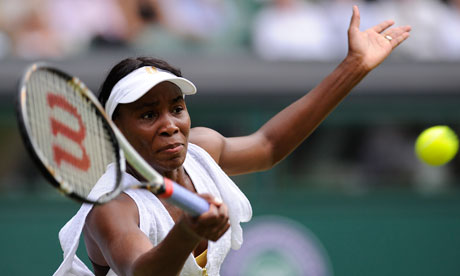 |
| Venus Williams suffers from an Auto-Immune Disorder Image from The Guardian |
As you all know I'm a table tennis player. I have played since I was 8 years old and as such at the age of 22 when this awful disease struck me, I had already played table tennis for over half my life and had made a lot of sacrifices and commitments to continue playing. I was initially sick for 2 months and lost over 25lbs in the second month after being misdiagnosed once already. The effect on my energy levels is probably more evident than anything else. Now I'm just a week away from my 24th birthday and I've started to get a better handle on my health problems.
Sometimes it is too easy for me to think that it may be too hard to keep competing, but as with everything in life some days are bad and some are good. The bad days I have very little energy or I'm ill or with fever, these are the difficult days, the ones where I start severely doubting whether playing sport is a viable option for me. It is on these days that I need to remember what I have given up to be here, and that the only real defeat is letting myself fade away to this horrible inconvenience of an illness.
Thankfully over the past year I have learnt more about managing my symptoms and my energy fluctuations are much less sporadic than they were in the beginning, this helps me sustain longer periods of training and up until recently I had pretty good energy levels for the past few months aside from a few off days. Unfortunately for the last 3 weeks I was sick again and that kind of spurred me on to write this. As with any sport, we develop character. Strong athletes have a fighting perseverance and determination that doesn't seem to die under any circumstances, and I believe that is what it really takes to keep moving forward. It is like any problem in life, you have to do the best with what you have.
I could have worked an office job off the back of studying economics in University, but I didn't want to do that. I strongly believe that if it's not something you would do for free (out of pure enjoyment) then don't do it at all, that's why I have strived to pursue opportunities in the sport I love so much and will continue to do so. So aside from having a strong attitude what has helped me continue to be an aspiring sportsperson?
I haven't lost sight of my goals:
My goals have not changed at any time since being diagnosed, I know I can still achieve them if I put in the right amount of effort. I don't see myself as being hindered, I don't see myself as being sick or less able to achieve my goals. As far as I'm concerned in terms of vision, nothing has changed. Being really focused on things also helps me keep everything below in line too!
Feeding Endorphins:
I try and do things that make my body feel good more frequently. Exercise is one of those things, every day I try and use small weights and have just started doing physical training again. Building up a sweat helps my body produce endorphins and makes me feel better (and more healthy). It doesn't matter how small the exercise is, just keep active!
Managing Energy:
This one can be difficult. Snacking is kind of important for me, I eat a lot of small meals and snacks especially when I am actively training or exercising. Of course I also make sure I have downtime and rest and do my best to sleep well.
It is also important to get some sunshine hours in too. Vitamin D is essential to the body and I found when I was sick and lying at home in bed for many months, being inside all the time probably didn't help.
Meditation and Avoiding Stress:
Sometimes during periods of extra stress I meditate, this helps calm the body and has proven results at helping control the body and keep it stable. When I felt a potential relapse coming on I meditated for 15 minutes each day and I felt it did help a bit.
DIET!:
This is number one for anyone suffering auto-immune problems. I have made some pretty big changes to my diet and things have been going really well.
Every day I drink a vegan based protein shake, each shake has a concentration of 1.5 cups of green vegetables as well as 20 grams of protein. I also add hempseed oil into the shake as it is a very pure and organic natural supplement.
Alongside that I have been taking Isotonix supplements, Bromelain + for immune support, B complex vitamin, OPC-3 antioxidant formula and Digestive Enzyme and Probiotics. I top that off with a 1500mg fish oil capsule.
I tried my best to cut down on red meat which is shown to have negative impacts on autoimmune conditions and also eliminated 99% of alcohol from my diet as well as being very disciplined with my dairy intake.
I have been cooking a lot of oriental style soups with kale and spinach bases as well as herbs like watercress, cilantro or parsley and lots of ginger and garlic.
As of this update on my diet I have been focusing on natural alternatives to medication for 3 months and I'm in pretty good shape. My body feels good and I have been able to put my focus back out on the table :)

